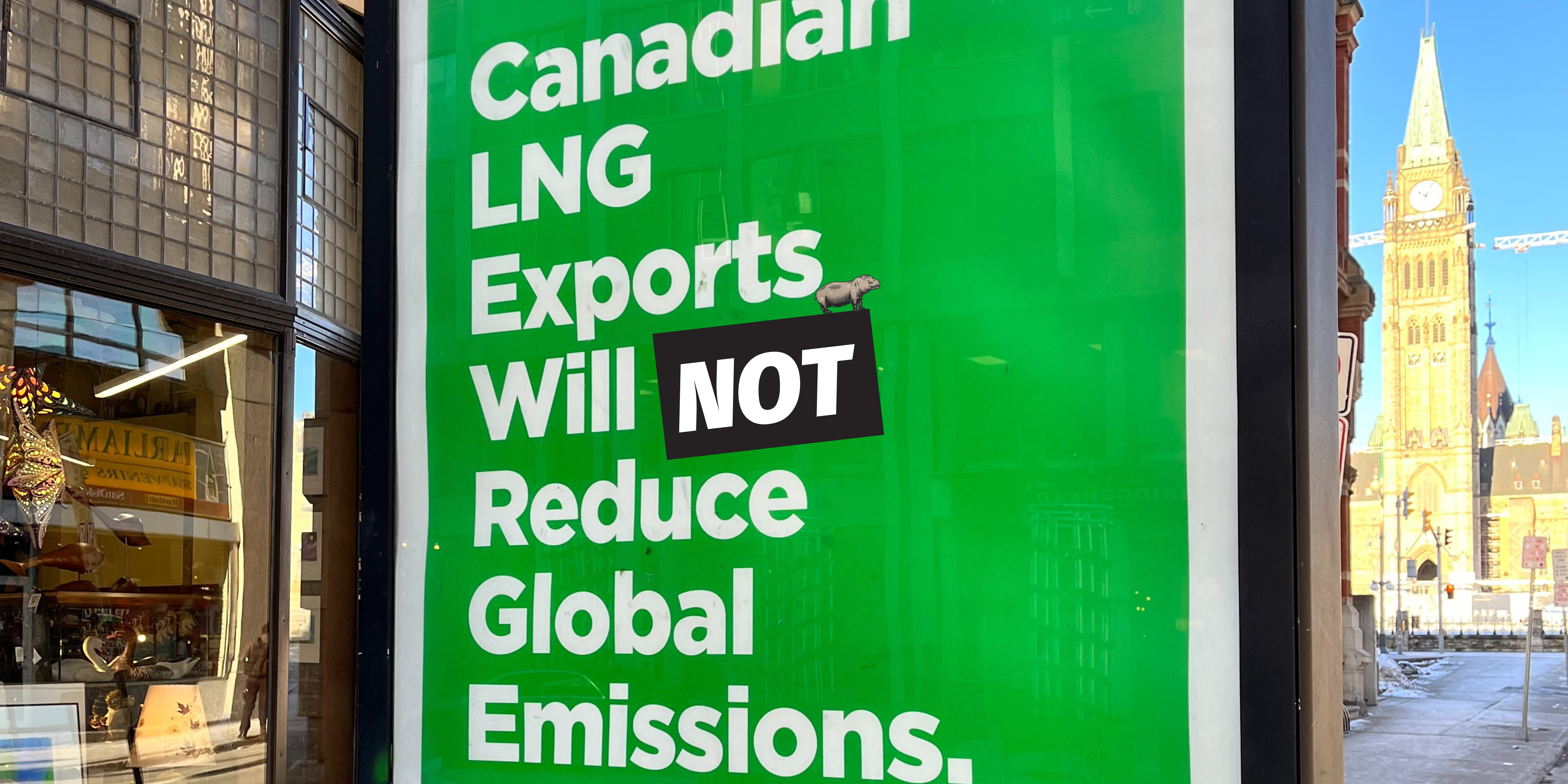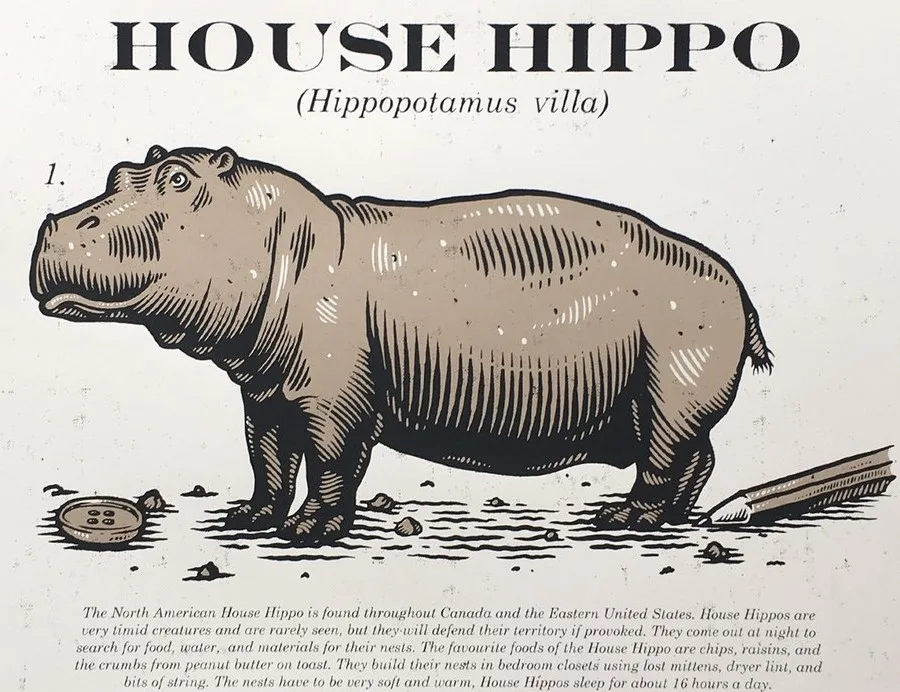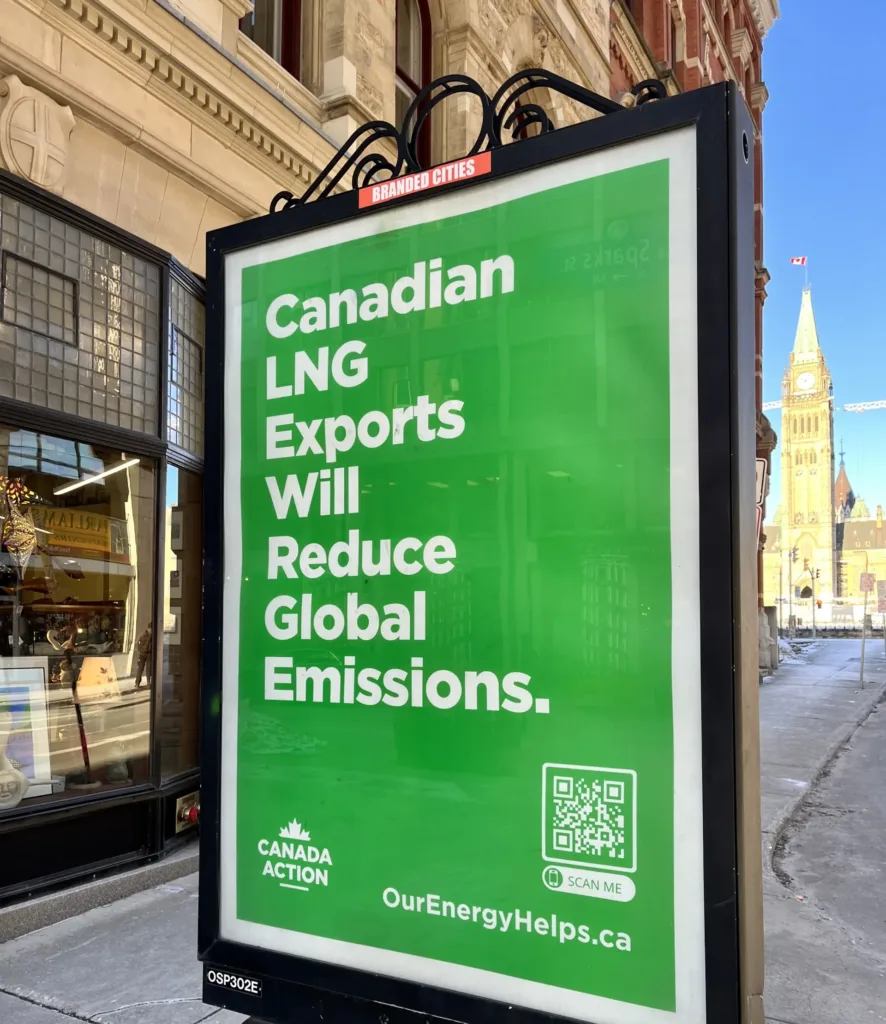How to Say No to LNG Greenwashing in Canada
See an ad that you think is greenwashing and want to do something about it? Read more to see what you can do to fight back in just a few minutes.

Written by Curtis Martin, Say No to LNG Canada Campaigner
Advertisements have a massive impact on us. Not only do we see staggering numbers of ads each day (upwards of 10,000), many leave a lasting impression. Commercials we saw as kids can bring out weird feelings of nostalgia, and many of us can sing along to ad jingles we haven’t heard in decades. Look no further than the fictitious, peanut butter scavenging House hippo for an example; this adorable miniature hippopotamus became something of a cultural icon in Canada after being featured in a ‘90s public service announcement about internet misinformation (no joke, a House hippo poster sits above my desk as I write this).

For-profit companies know the impact of ads and use it to their advantage. This is why they put commercials in front of nearly every internet video, are willing to spend $7 million for a 30 second Super Bowl ad, and are risking legal action to show commercials on our previously ad-free video streaming services.
But what happens when an ad doesn’t tell the truth or leaves out important information? Is there anything we can do? When my colleague recently sent me pictures of misleading fossil fuel ads posted around Ottawa, Canada featuring liquified natural gas (LNG), I did some digging to find out.
Greenwashing
Greenwashing is when a company makes misleading or false claims to appear environmentally friendly when they’re not. It’s an intentional strategy often used by fossil fuel companies to convince people they’re fixing the climate crisis when they actually deserve most of the blame for it. Here’s a great example:

This ad sent to me by a colleague from downtown Ottawa, Canada, is greenwashing. Burning LNG emits methane—a greenhouse gas that is 80 times more powerful than carbon dioxide—meaning continued export of LNG only worsens our climate emergency. This claim that Canadian LNG exports will reduce global emissions is unsubstantiated; in fact, evidence suggests that the emissions-intensive fracking process used to make LNG, combined with a transport process that leaks methane directly to the atmosphere, makes LNG exports even worse for the climate than the coal burning they would replace. The ad also leaves out how damaging LNG is for people’s health: pollution from the production and burning of LNG is associated with increased emergency room visits and premature deaths.
Greenwashing is not allowed in Canada, and the Canadian Association of Physicians for the Environment (CAPE) and Greenpeace have a spectacular toolkit outlining how to identify and report greenwashing. In it, they share two main ways to file a formal complaint against greenwashing in Canada: 1) Report the ad to the Competition Bureau of Canada, or 2) Report the ad to Advertising Standards Canada.
Competition Bureau of Canada (better for organization complaints)
The Competition Bureau is an independent law agency that can fine companies or require them to remove ads when in violation of Canada’s Competition Act. Complaints filed with the Competition Bureau have forced companies to take down advertising campaigns, but involve an intensive process and can take up to three years for a decision, during which ads are allowed to remain up. This makes Competition Bureau complaints more suited to organizations who have the experience and person-power to file a detailed complaint, like those currently open against the Canadian Gas Association, Pathways Alliance, and Enbridge Gas.
Advertising Standards Canada (better for individual complaints)
In contrast, complaints filed with Advertising Standards—a not-for-profit ad regulatory organization—can be submitted through a simple online form in just a few minutes, with decisions taking six weeks or less. If an ad is deemed in violation of the Canadian Code of Advertising Standards, companies are asked to amend or withdraw it.
Being a much more accessible option for individuals, I decided to submit a complaint using the Advertising Standards process. All it required was ticking a few boxes (the company responsible for the ad, the product it advertised, where it was seen and when), adding a picture of the ad, and describing why it was in violation of the code of standards due to greenwashing.
Canada Needs More Effective Anti-Greenwashing Efforts
Although it was great to submit this complaint, my findings on options for fighting greenwashing revealed that Canada isn’t doing nearly enough to limit it.
Even under the quicker Advertising Standards process, a decision can take up to six weeks, and the ad stays up until there’s a decision. With complaints under the Competition Bureau, this problem can stretch across years. Without better rules, greenwashing can still do damage before it’s caught and reported.
The good news is that Canada can strengthen its efforts on greenwashing. Amendments to the Competition Act are moving through parliament and would require companies to back-up their ad claims with evidence. Limiting ads on all fossil fuels (in a manner similar to tobacco ads of the ‘90s) would effectively eliminate fossil fuel greenwashing.
Canada can also learn from other nations. Earlier this year, the European Union adopted a new law preventing companies from using generic environmental language without proof, and restricted green labels that don’t have official certifications. These rules are critical for countering greenwashing, such as misleading LNG claims from cruise companies.
Take Action and Say No To LNG Greenwashing
Each year we step further into a climate emergency—one that is challenging enough to overcome without fossil fuel greenwashing misleading us with false solutions. With a surge in greenwashing complaints cited by the Competition Bureau, it is clear greenwashing ads show no signs of slowing down.
LNG greenwashing is the latest in a string of fossil fuel lies distracting us from real climate solutions—a lie our Say No To LNG campaign has been fighting against for one year with warnings to not be fossil fooled, a global solutions framework for shipping, and global protests calling for LNG to be left out of international climate shipping measures. We’ve also outlined steps Canada can take to ensure LNG is not used as a climate solution.
Our campaign will be monitoring LNG greenwashing in Canada, but we need your help! If you see an LNG (or any fossil fuel) ad that you suspect might be greenwashing, take a picture and send in a complaint to Advertising Standards, following the steps on page 5 of this toolkit, and downloading our sample letter to create your own. If you have other creative ideas on how to fight greenwashing on LNG and shipping, you might be able to get funding for it through our super accessible micro-grant program. And for more information on how to fight greenwashing, check out the full CAPE and Greenpeace toolkit.
Ads have a big impact on us, but it doesn’t have to end there. Let’s use our collective power to fight back and have a big impact on ads. Especially those that mislead us to further our use of LNG and its damaging methane emissions.
Blog post written by Curtis Martin (Say No to LNG Canada Campaigner), with contributions from Andrew Dumbrille (Say No to LNG Canada Campaigner & Equal Routes Co-Founder) and Elissama Menezes (Say No to LNG Global Director & Equal Routes Co-Founder).

For media inquiries please contact [email protected].